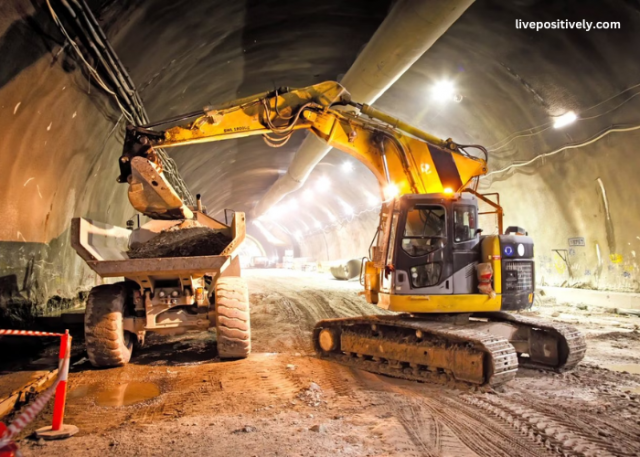Heavy equipment has been a cornerstone of industries such as construction, mining, and agriculture for decades. From the roaring diesel engines of the early 20th century to the innovative electric machines emerging today, the evolution of heavy equipment reflects significant technological and environmental advancements. Companies like these mechanical engineering company play a pivotal role in driving this transformation. Let's explore the journey from diesel-powered machines to electric heavy equipment and what the future holds for this vital industry.
The Diesel Era: Powering the Industrial Revolution
The introduction of diesel engines in heavy equipment marked a turning point in industrial operations. Developed in the late 19th century, the diesel engine offered superior efficiency and power compared to steam engines. By the mid-20th century, diesel-powered machines became the backbone of heavy industries, driving the construction of highways, skyscrapers, and major infrastructure projects.
Diesel engines revolutionized productivity, providing reliable performance under demanding conditions. Their high torque output and durability made them ideal for equipment such as excavators, bulldozers, and dump trucks. However, as these machines proliferated, so did concerns about their environmental impact. The emissions from diesel engines became a significant contributor to air pollution and greenhouse gases, prompting the need for cleaner alternatives.
The Push for Sustainability: Hybrid Systems
The early 2000s saw a shift towards hybrid systems in heavy equipment. Hybrid machines combined the power of diesel engines with electric components, such as batteries and electric motors. This approach aimed to reduce fuel consumption and emissions without compromising performance.
Hybrid heavy equipment, such as excavators and wheel loaders, gained popularity in industries focused on reducing their carbon footprint. These machines demonstrated improved fuel efficiency and lower operating costs while maintaining the reliability of traditional diesel engines. The success of hybrid systems paved the way for further innovation in electrification.
The Rise of Electric Heavy Equipment
Recent years have witnessed a growing interest in fully electric heavy equipment. Advances in battery technology, coupled with increased environmental awareness, have accelerated the development of electric alternatives. Unlike diesel engines, electric machines produce zero emissions during operation, making them a cleaner choice for industries committed to sustainability.
Electric heavy equipment offers several advantages beyond environmental benefits. These machines are quieter, reducing noise pollution on job sites and in urban areas. They also feature fewer moving parts than diesel engines, resulting in lower maintenance costs and improved reliability. Additionally, the absence of diesel fuel eliminates the risk of spills and associated cleanup costs.
Challenges in Transitioning to Electric Equipment
While the shift to electric heavy equipment is promising, it comes with challenges. One of the primary obstacles is the limited energy density of current battery technology. Batteries in heavy equipment must be large and powerful enough to support demanding operations, yet compact enough to fit within the machine's design.
Charging infrastructure is another critical factor. Unlike passenger electric vehicles, heavy equipment often operates in remote or off-grid locations where access to charging stations may be limited. This necessitates the development of portable or on-site charging solutions to support widespread adoption.
The upfront cost of electric equipment remains higher than traditional diesel machines. However, these costs are expected to decrease as battery technology advances and economies of scale improve. Furthermore, the long-term savings in fuel and maintenance often offset the initial investment.
Innovations Driving the Future of Heavy Equipment
The future of heavy equipment is being shaped by several groundbreaking innovations. Automation and remote operation are becoming more prevalent, enabling equipment to perform tasks with precision and efficiency. Combined with electric power, these technologies offer significant potential to transform the industry.
Hydrogen fuel cells are also emerging as a viable alternative to batteries in heavy equipment. Fuel cells generate electricity through a chemical reaction between hydrogen and oxygen, producing only water vapor as a byproduct. This technology offers longer operating times and faster refueling compared to batteries, making it particularly suited for heavy-duty applications.
The Role of Mechanical Engineering Companies
Mechanical engineering companies are at the forefront of this evolution, designing and manufacturing advanced solutions to meet industry demands. Companies like these mechanical engineering company are developing cutting-edge technologies that enhance efficiency, reduce environmental impact, and improve safety.
By leveraging expertise in materials science, energy systems, and automation, these companies are helping industries transition to sustainable practices. Their contributions ensure that the heavy equipment of tomorrow is not only powerful but also environmentally responsible.
Conclusion: A Sustainable Path Forward
The evolution of heavy equipment from diesel to electric marks a significant milestone in industrial history. As industries prioritize sustainability and efficiency, the demand for electric and hybrid solutions will continue to grow. Overcoming challenges such as battery limitations and infrastructure requirements will be key to accelerating this transition.
With the support of innovative mechanical engineering companies, the future of heavy equipment promises to be cleaner, quieter, and more efficient. As the industry embraces these advancements, we can look forward to a new era of heavy equipment that balances performance with environmental stewardship.






